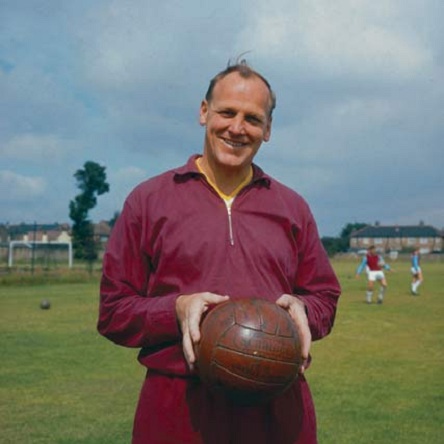“THIS week, next week, every week, some team boss is liable to get fired – and there will immediately be almost a pitch-sized queue of applicants jostling to step into his shoes.”
Ron Greenwood speaking in 1976 (but it still applies).

The Clown Prince
Len Shackleton was an England schoolboy international who initially joined local club Bradford Park Avenue. Arsenal manager George Allison, made aware of the youngster’s talents, travelled to Bradford and persuaded him to join the North London club.
Shackleton moved down to London and was allowed to play for non-league Enfield in the Athenian League. Allison eventually told the forward that he was too small to make it and he took a job in the London Paper Mills in Dartford.
At the outbreak of World War Two Shackleton returned to Bradford, signing for Park Avenue and receiving a £10 signing-on fee (which the hard-up club paid in instalments). He also took a job assembling aircraft radios. On Christmas Day 1940 he played for Bradford in the morning and then as a guest for Huddersfield Town in the afternoon, scoring in both games. In wartime matches he scored a total of 171 goals in 209 games.
Due to be called up for national service in 1945 he became a Bevin Boy so that he could continue playing football. But he found the work too much to combine with football and started skipping shifts in the pits which resulted in him being called up to serve in the RAF.
Shackleton started playing again for Bradford in the 1946-47 season, scoring four goals in seven games before walking out on the club after barracking from fans over his individual style of play.
In October 1946 Newcastle United bought Shackleton from Bradford for £13,000 as a direct replacement for Albert Stubbins who they had sold to Liverpool for the same fee.
He made his debut for Newcastle against Newport County on 5 October 1946 and scored six goals in a 13-0 win including a hat trick in 155 seconds.
Shackleton spent two seasons at St James’ Park but was repeatedly critical of the directors. In 1948 United sold him to local rivals Sunderland. On leaving United he reportedly said; “I’ve no bias against Newcastle – I don’t care who beats them!”
He scored just under 100 league goals during nine seasons at Roker Park, retiring after injuring his ankle on the opening day of the 1957-58 season. At Sunderland he clashed with fellow star Trevor Ford who at one time reportedly refused to play alongside him.
After retiring, Shackleton wrote his autobiography ‘Clown Prince of Soccer?’. Chapter 9 was titled ‘The average director’s knowledge of football’ and was left blank.

No Slippery Shirt
In 1927 Cardiff City took the FA Cup out of England for the first – and thus far only – time when they overcame Arsenal 1-0 at Wembley.
Many have claimed that the reason for goalkeeper Dan Lewis letting the ball slip through his grasp was due to his new jumper being slippery. Arsenal captain Charles Buchan gave the definitive answer.
“Lewis took his eye off the ball”, said Buchan some years later. “After he had gathered a shot from Cardiff centre-forward Hugh Ferguson, he looked up to see how close was Len Davies, the onrushing Cardiff inside-left.
“Lewis was on one knee at that instant, and as he rose, knocked the ball out of his arms with his knee. It rolled – oh, so slowly! – over the goal-line for the only goal of the game”.

149,547 – At Least
When Scotland hosted England in 1937 interest in the game, and especially in matches between the two, was at fever pitch. The Scottish FA, aware of the interest, made the game all-ticket and sold a massive 149,547 of them. Add in complimentary tickets, press tickets, police tickets and staff and the actually attendance would have been well over 150,000
England dominated the first half but went in for half-time with just a single goal lead, courtesy of Stoke City’s Freddie Steele.
The second period was a different story. Bob McPhail of Rangers scored twice, Preston’s Frank O’Donnell added a third and the Scots ran out comfortable winners sending most of those 149,547 (+) fans home happy.

Alvin’s special Hat–trick
On 21 April 1986 centre-half Alvin Martin scored a hat-trick for West Ham United in their 8-2 thrashing of Newcastle United.
Impressive – but perhaps even more was that he scored the three goals against three different Goalkeepers. Martin began his treble against regular goalkeeper Martin Thomas who then got injured. His replacement was defender Chris Hedworth and the Hammers defender got his second against him
Hedworth was later injured too and replaced by Peter Beardsley and with five minutes remaining the Hammers were awarded a penalty. Given the chance to take the penalty despite regular penalty taker Ray Stewart being on the pitch, Martin duly dispatched the spot-kick to complete his memorable hat-trick.

A Dual International
In 1906 Wrexham winger Bob Evans was selected for Wales, making his debut in a 2-0 victory over Scotland. Three days later he played in the 1-0 defeat by England where he was spotted by Aston Villa who signed him for £30.
Whilst at Villa he continued to represent the principality although he played only sporadically for his club. In 1910 he was transferred again, this time to Sheffield United (along with Peter Kyle for a combined fee of £1,1000). He quickly became a regular for the Blades.
In 1911, after making 10 appearances for Wales, it was discovered that, although his parents were Welsh, Evans had in fact been born in Chester, England, therefore making him eligible to play for his country of birth. He went on to make four appearances for his ‘new’ country in 1911 and 1912, including playing twice against the Welsh.
In total Evans played 14 internationals for the two countries including playing four times for Wales against England and twice for England against Wales.

